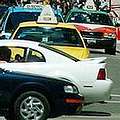 加州州長阿諾史瓦辛格6月13日警告美國環保局,表示一項有關加州嚴格的機動車溫室氣體排放標準的法律訴訟將無法避免,除非環保署在2007年10月24日前決定是否讓加州的標準通過。
加州州長阿諾史瓦辛格6月13日警告美國環保局,表示一項有關加州嚴格的機動車溫室氣體排放標準的法律訴訟將無法避免,除非環保署在2007年10月24日前決定是否讓加州的標準通過。
2004年加州開全美首例,實施汽車溫室氣體減排規定。這項法規要求在京都議定書減排標準年的2012年之前將加州的二氧化碳及其他污染物的排放量減少22%,並在2016標準年之前要減少30%。
美國環保局局長強森(Stephen Johnson)6月8日告訴美國眾議院全球暖化特別委員會,他打算等到明年稍晚再決定是否簽署此機動車廢氣排放管控法規。
在13日給強森的公函中,史瓦辛州長表達了對法案簽署延遲的抗議。他也指責美國聯邦運輸部官員在這星期串聯國會議員,要求他們對這項加州對抗全球氣候變遷的努力投反對票。
加州政府在2007年4月26日給環保署180天的寬限期,10月24日到期後未決,加州將控告聯邦政府,依據「清淨空氣法案(Clean Air Act)」及「行政程序法案(Administrative Procedure Act)」的相關規定強制聯邦政府解決法案延遲決策的問題。
除非加州政府某些條件並未達到,美國環保局有義務提供一個妥協的回應(waiver)。也就是說,除非加州不再需要維持一個獨立的機動車排放計畫,除非加州的計畫與聯邦清淨空氣法案的原則不一致,或是加州的法案訂定是「一意孤行並且恣意而為的」。
在加州於2005年12月要求聯邦妥協後,美國環保局卻將此提案擱置並未加以考慮,目的是要避免加州及其他11州對機動車二氧化碳及其他溫室氣體減排採取行動。
Governor Arnold Schwarzenegger today warned the U.S. Environmental Protection Agency that a lawsuit over California's tough motor vehicle greenhouse gas emissions standards is "inevitable" unless the federal agency decides whether or not to allow them by October 24, 2007.
In 2004, California adopted the nation's first regulation to reduce greenhouse gas emissions from cars. It requires emissions of carbon dioxide and other pollutants to be reduced by 22 percent by the 2012 model year and 30 percent by the 2016 model year.
Last Friday, U.S. EPA Administrator Stephen Johnson told the U.S. House of Representatives Special Committee on Global Warming that he intends to wait until late next year to decide on whether to issue regulations controlling emissions from vehicles.
In his letter to Johnson today, Governor Schwarzenegger objected to that delay. He also complained that as recently as this week, "The U.S. Department of Transportation defended the fact that department officials are contacting members of Congress and urging them to oppose our efforts to fight global climate change."
California gave 180-day notice on April 26, 2007, of the state's intent to sue under the Clean Air Act and Administrative Procedure Act, which provide mechanisms for compelling delayed agency action. That 181st day falls on October 24.
The EPA is obligated to provide a California a waiver unless certain conditions are not met - unless California no longer needs to maintain an independent motor vehicle emissions program, unless the California program is not consistent with the Clean Air Act, or if the state's rulemaking is "arbitrary and capricious."
But while the state requested the waiver in December 2005, the EPA has left it pending without consideration, preventing California and the other 11 states from taking action to reduce carbon dioxide and other greenhouse gas emissions from automobiles.
全文及圖片詳見ENS





